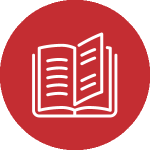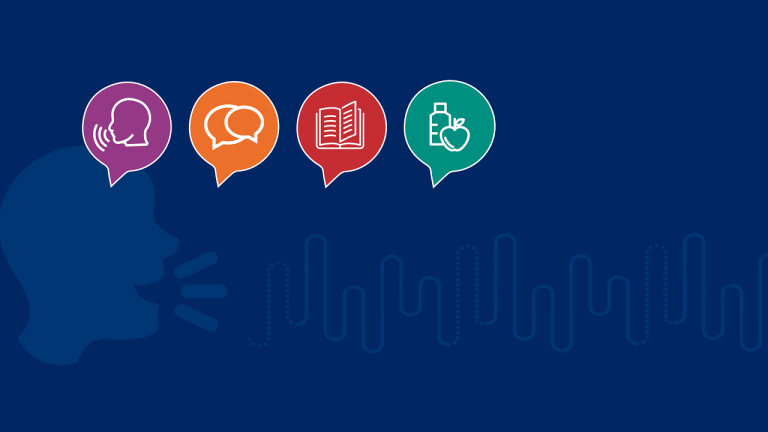Overview

Early literacy skills are essential for later reading and writing development. Early literacy skills include:
- knowing how speech sounds and letters of the alphabet are linked (e.g., the sounds each letter makes)
- identifying sounds at the start and end of words (e.g., bus starts with a ‘b’ sound)
- breaking words into sounds (e.g., dog has three sounds d -o-g)
- clapping out syllables in words (e.g., birth-day-cake, a-ni-mal)
- rhyming (e.g., cat, hat, mat)
- print awareness (knowing about parts of books, such as the cover, title, and words on a page).
Literacy is a learned skill. Children are not born with the ability to read and write; they need to be taught. Literacy is important because it helps children to participate and learn at school and in other situations.
Some children have difficulty with reading and writing or with early literacy skills. Children with speech and/or language difficulties are at greater risk of developing literacy difficulties.
Speech pathologists can help children with their early literacy skills.
Terms used to describe children with reading and writing difficulties include phonological awareness difficulties, dyslexia, and reading impairment. A speech pathologist can be part of the team working with a child to support their literacy development.
What is early literacy and how to help
This short video explains:
- What is early literacy?
- What should a child know and when?
- How can I help a child with early literacy difficulties?
Children's literacy
Children's literacy - What it is and how to help.
What should a child know and when
Children learn literacy skills gradually. Children need to learn early literacy skills (e.g., print knowledge and phonological awareness skills) to be able to read and write. Children’s speech and language skills are foundations for reading, spelling and writing.
Children typically begin by engaging in shared book reading, songs, and rhymes. Children then learn letter-sound relationships, how to read and write the letters of the alphabet and simple common words. Children become more accurate and fluent readers and writers with lots of practise.
Reach Out and Read have a chart summarising children’s literacy development across different ages.
What you can do to help
You can help children learn early literacy skills in several ways.
Reading books aloud with children in an interactive way. This helps develop children’s speech, language and early literacy skills, and helps prepare them for reading and going to school.
- Talk about the pictures in the book.
- Point to the words and move your finger along the sentences as you read them aloud.
- Make comments about pictures and words on the page (e.g., this word says go!).
- Ask the child questions about the pictures and words (e.g., What do you think this picture is of? What do you think this word says?).
- Talk about where the cover of the book is, and practise turning the pages.
- Use intonation to create interest (e.g., by saying things in fun ways and using different voices).
- Have fun and praise children for having a go and sharing the book with you.
Talk about words and their sounds.
- Talk about words and pictures that start with the same sound, such as in alphabet books (e.g., pictures of door, dog, daddy all start with ‘d’). You can pick out words that start with the same sound as the child’s name.
- Talk about words that rhyme (cat and hat both end in -at, they rhyme).
Read with children every day. Books help children to learn the connections between words and objects/pictures. This helps them learn the meanings of new words and use those new words in their own talking.
Access to books is beneficial for children’s overall language development. Have a selection of books available for children to choose from. Younger children may like pop-up books or lift-the-flap books. Your local library has lots of books to choose from.
Talk about letters, words and logos you see. Point out names of places, logos, and symbols on signs for children at their favourite places to visit. Words and letters are all around us.
Sing songs and rhymes with children. Many rhymes and songs involve actions which children enjoy.
Printable handouts
Here are handouts to download containing practical activities/ideas you can do with children to help their literacy development.
- Learning about books and print (PDF 624.52KB) – (this resource is available in other languages).
- Early literacy skills (PDF 756.35KB).
More information
Visit these websites for more information about supporting children’s literacy development:
- BookTrust has tips and advice about reading with children and also has videos showing examples of how to read with children.
- Raising Children Network has tips for reading with toddlers.
- Getting Ready for School – the Deadly Way is a series of videos about helping children’s school readiness skills, including ideas for shared book reading.
- Book Share Time lists books recommended by a speech pathologist to practise different skills.
- American Speech-Language-Hearing Association has detailed information about written language disorders.
- Speech Pathology Australia - Fact sheets (Download “Literacy”).
Check with your local library for story time or other children’s groups that may be held at the library.
Please note: This web page has been developed for families by Western NSW Local Health District and Charles Sturt University, as part of a NSW Health Translational Research Grant titled “Waiting for speech pathology: Device versus advice?”.
